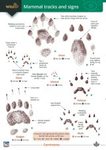By
Leon (NHBS Catalogue Editor)
5 Jun 2019
Written for Paperback

The seed of this book, if you will forgive me the pun, lay in an unfortunate collision between a football and the author’s scrotum. This led former neurobiologist Liam Drew to write a piece for Slate about the mammalian testicles and their precarious positioning in the males of this group. Before long, with the birth of his first daughter, he started wondering about lactation and all the other features and oddities that make us mammals. The resulting
I, Mammal is a witty, irreverent overview of mammalian biology and evolution that is sure to entertain.
In 13 chapters, Drew takes a roughly chronological journey through a mammal’s life, starting before conception, considering testicles, genitals, placentas, lactation, parental care and chromosomal sex determination. But also more general traits such as teeth and jaws, temperature regulation, senses, and brains. Throughout, Drew seeks to uncover the evolutionary history of these traits, returning frequently to comparisons with marsupials and monotremes (the group to which the platypus and echidna belong). These groups branched off earliest in mammalian evolution, before the development of placental mammals, and are thus a useful benchmark.
En route, Drew is keen to dispel misconceptions surrounding evolution, such as the by biologists long-abandoned idea of humans as the crowning achievement (apparently even Linneaus did not think so, but did not dare put that in writing just yet), or the notion of evolution as a linear, long-term-goal–oriented process. But he is especially keen to show that parts of animals do not evolve alone, even if we often consider them in isolation for the sake of convenience and clarity. He returns to this theme at the end of the book when considering lactation (see
Milk: The Biology of Lactation for more). For milk to be dispensed you obviously need to evolve a milk dispenser in the form of mammary glands, argues Drew, but you need a way of storing energy that can later be converted to milk – why, you need a mother that cares for offspring to start with. And with lactation lots of possibilities open up, the reliable and constant energy supply allowing the evolution of bigger brains for example. Like Tom Kemp (see his
The Origin & Evolution of Mammals, but especially
The Origin of Higher Taxa), Drew sees interdependencies looping back on themselves everywhere.
The book’s initial focus on reproductive biology allows for plenty of irreverent writing. Drew delights in serving up unusual facts (“While we’re here, the scrotum of the yellow-bellied house bat is reportedly behind the anus”) and remarkable anecdotes such as Jack the tapir at San Francisco Zoo who stood on his own penis (“it fell off, and he ate it”). And the dik-dik, a small antelope where the males contribute nothing to childcare, is not named to comment on this apparent neglect, jokes Drew. But despite the potential for smut, he is surprisingly straight-faced throughout, marvelling at phalluses and placentas in equal measure. The latter, as he makes clear, is a remarkable organ that is incredibly varied in different mammals (see
Life's Vital Link for more).
In later chapters the subjects get more technical as Drew discusses mammalian phylogeny, endocrinology, sensory biology, neurobiology, and metabolism. Useful illustrations are included to help you understand brain architecture and proposed changes to the mammalian family tree. I learned some remarkable things here, such as the evolution of the defining mammalian jaw joint, while the original bones “went off to enjoy a most wondrous second career as parts of the mammalian middle ear” (the hammer, anvil, and stirrup). Wait, what?!
What stands out here is how Drew manages to provide very readable histories of the research on certain subjects. Especially his overview of how, over the decades, our thinking on mammalian metabolism and
warm-bloodedness, pardon me,
endothermy has changed was an eye-opener for me. He gives the final word to Barry Lovegrove (see his upcoming
Fires of Life for more), but not before considering many other ideas that have done the rounds. Similarly, the chapter on brain evolution does not shy away from considering controversial ideas (e.g. Harvey Karten’s ideas that bird brains, despite a different architecture, are really not that different).
I, Mammal is a wonderfully entertaining book that wears its academic content lightly, all the while packing in a huge amount of content. It is a book borne as much from Drew’s fascination with evolution as it is from his personal journey into fatherhood, another recurring theme in the book. This is the kind of excellent popular science that you can nowadays reliably expect from the Bloomsbury Sigma imprint.


















![How to Find and Identify Mammals [Revised Edition]](http://mediacdn.nhbs.com/jackets/jackets_resizer_medium/21/210208.jpg?height=150&width=106)

















